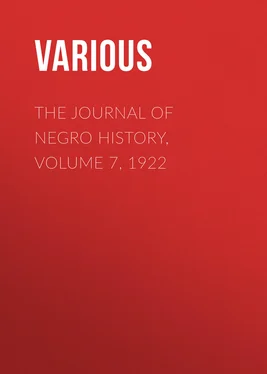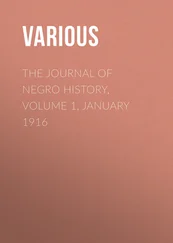Various - The Journal of Negro History, Volume 7, 1922
Здесь есть возможность читать онлайн «Various - The Journal of Negro History, Volume 7, 1922» — ознакомительный отрывок электронной книги совершенно бесплатно, а после прочтения отрывка купить полную версию. В некоторых случаях можно слушать аудио, скачать через торрент в формате fb2 и присутствует краткое содержание. Жанр: foreign_antique, periodic, История, foreign_edu, на английском языке. Описание произведения, (предисловие) а так же отзывы посетителей доступны на портале библиотеки ЛибКат.
- Название:The Journal of Negro History, Volume 7, 1922
- Автор:
- Жанр:
- Год:неизвестен
- ISBN:нет данных
- Рейтинг книги:3 / 5. Голосов: 1
-
Избранное:Добавить в избранное
- Отзывы:
-
Ваша оценка:
- 60
- 1
- 2
- 3
- 4
- 5
The Journal of Negro History, Volume 7, 1922: краткое содержание, описание и аннотация
Предлагаем к чтению аннотацию, описание, краткое содержание или предисловие (зависит от того, что написал сам автор книги «The Journal of Negro History, Volume 7, 1922»). Если вы не нашли необходимую информацию о книге — напишите в комментариях, мы постараемся отыскать её.
The Journal of Negro History, Volume 7, 1922 — читать онлайн ознакомительный отрывок
Ниже представлен текст книги, разбитый по страницам. Система сохранения места последней прочитанной страницы, позволяет с удобством читать онлайн бесплатно книгу «The Journal of Negro History, Volume 7, 1922», без необходимости каждый раз заново искать на чём Вы остановились. Поставьте закладку, и сможете в любой момент перейти на страницу, на которой закончили чтение.
Интервал:
Закладка:
The question which next presents itself is: "How could anyone justify such a system by which one man is enslaved to the other, sacrificing his right to life, liberty, and happiness that another might prosper?" In the first place, the planter argued that the Negroes were naturally inferior to the white race and could not enjoy the intellectual pursuits; for they had always been savages, having lived in savagery in Africa before taken into captivity and, even in the nineteenth century when freed in Hayti, returning to that state of civilization. From this fact it was argued that, inasmuch as the Negroes belonged to an inferior race, it was only natural that men should enslave them and that they should be controlled by their superiors. Chancellor Harper said: "It is the order of nature and of Heaven that the being of superior faculties and knowledge, and therefore of superior power, should control and dispose of those who are inferior."
The planter argued, secondly, that the Negro was happy and contented in slavery; for he was secure, working for the master, and in return receiving good care all of his life. He was relieved of all worry of sickness or old age, for he knew his master would have to care for him. In time of business depression it was not he who suffered, but the master. On the other hand, the free worker of the North labored for his employer during the best part of his life and then, when no longer able to work, or during business depression, was turned away and obliged to suffer from lack of care. It was maintained that the assertion that the Negro was not happy when he might be whipped was "pathos misapplied." If a man hired a white laborer who robbed him, he dismissed the worker, who was then sentenced to prison, thus disgracing his family, which then suffered from lack of support. On the other hand, a master could not discharge his slave, but whipped and corrected him. After the whipping the Negro felt no bad consequence and his family did not suffer from his wrong doings. It was asserted that the slave was happy and loved his master as a father, "looking up to him as his supporter, director, and defender." Dew inquired: "Why, then, since the slave is happy and happiness is the great object of all animated creation, should we endeavor to disturb his contentment by infusing into his mind a vain and indefinite desire for liberty, a something which he can not comprehend and which must inevitably dry up every source of his happiness?"
But the chief argument advanced was that slavery was the price of prosperity and progress of the South. The North had a moderate climate because of the sea breeze and elevation, and thus white men were able to till the soil, while the intense heat of the South rendered it impossible for the white man to work in the fields and made a large supply of black men necessary. As Harper said, "The products of slave labor furnished more than two-thirds of the materials of our commerce, employed in transporting and exchanging; and among the slaveholding States is to be found the greater market for all the productions of their industry, of whatever kind. The prosperity of those States, therefore, and the civilization of their cities have been for the most part created by the existence of slavery." In addition, slavery released the planter from manual labor and gave him more time to cultivate his mind, and thus the Southern planter was highly educated, cultured, and refined. In the mind of the planter, slavery was "the defence of human civilization." Students of economics, however, saw that it was an evil which had to pass away.
Frances L. HunterTHE EVOLUTION OF THE NEGRO BAPTIST CHURCH
The freedom and local democracy of the Baptist Church enabled the Negroes to participate in the affairs thereof much earlier than they were so indulged in the other denominations. Pioneer Negro preachers and churches, therefore, first appeared in the Baptist Church. The development of the attitude of the Baptist Church toward the Negro, however, has been by cycles. The relations of the two races in church matters differ widely from what they were years ago. Members of both races formerly belonged to the same congregation, which in the beginning in this country ignored social distinctions. They have since then undergone radical changes to reach the present situation in which they have all but severed connection with each other.
In the beginning, the attitude of the so-called Christian whites toward the early Negro preachers was that of hostility. This opposition, however, did not come from the Baptists themselves, but from the master class. George Liele in the West Indies, Andrew Bryan in Georgia, and David George in Canada had much difficulty in their pioneer work, suffering many indignities and hardships. Andrew Bryan was whipped in a cruel and bloody manner but triumphed over persecution by his bold declaration that he was willing to die for Jesus. Rev. Mr. Moses, working in Virginia about this time, was often arrested and whipped for holding meetings. Others were excommunicated, but such opposition could not stay the progress of the work, for these pioneer preachers finally succeeded. This is attested by the resolution of the white Baptist Association expressing deep regret on the occasion of the death of Andrew Bryan. 15 15 The resolution was: "The association is sensibly affected by the death of the Rev. Andrew Bryan, a man of color, and pastor of the first colored Church in Savannah. This son of Africa, after suffering inexpressible persecutions in the cause of his Divine Master, was at length permitted to discharge the duties of the ministry among his colored friends in peace and quiet, hundreds of whom, through his instrumentality, were brought to the knowledge of the truth as it is in Jesus. He closed his extensively useful, and amazingly luminous course, in the lively exercise of faith, and in the joyful hope of a happy immortality." See Benedict's History of the Baptists .
When the Baptists had won a standing after the grant of toleration in the United States and Negroes began to connect themselves with them, the status of the blacks in the Baptist Church had to be determined. Was the Negro to be a mere member in the back seat or a participant in the work of the Church? Under the labors of inspired white men thousands of Negroes were converted, baptized, set apart as churches, and instructed in all things which pertain to a life becoming the gospel of Christ. White persons, on the other hand, have been converted through the preaching of Negroes, and a few Negroes, even in the Southland, have been pastors of white Baptist churches. Speaking of the resignation of Mr. Thomas Armistead, who was pastor of the Portsmouth Church, in Virginia, until 1792, Robert B. Semple, in his History of the Baptists of Virginia , remarks: "After his resignation the church declined greatly. They employed Josiah Bishop, a black man of considerable talents, to preach to them. This, as might have been expected, could not answer in Virginia." 16 16 Semple, History of the Baptists in Virginia , p. 355.
Another instance of the same character is related by Mr. Semple, in connection with the Pettsworth or Gloucester Church. In his statement in regard to the death of Rev. Robert Hudgin, their first pastor, he observes that "This church continued to prosper moderately until Mr. Hudgin's death. They were then left without any person to go in and out before them. They at length did what it would hardly have been supposed would have been done by Virginians; they chose for their pastor William Lemon, a man of color." "He also died after several years. Since then," remarks Mr. Semple, "they have been destitute of stated ministerial aid." Here, then, is a man of color, who was pastor of a white Baptist Church in Virginia to the day of his death, covering a period of "several years." 17 17 Semple, History of the Baptists in Virginia , p. 356.
Интервал:
Закладка:
Похожие книги на «The Journal of Negro History, Volume 7, 1922»
Представляем Вашему вниманию похожие книги на «The Journal of Negro History, Volume 7, 1922» списком для выбора. Мы отобрали схожую по названию и смыслу литературу в надежде предоставить читателям больше вариантов отыскать новые, интересные, ещё непрочитанные произведения.
Обсуждение, отзывы о книге «The Journal of Negro History, Volume 7, 1922» и просто собственные мнения читателей. Оставьте ваши комментарии, напишите, что Вы думаете о произведении, его смысле или главных героях. Укажите что конкретно понравилось, а что нет, и почему Вы так считаете.












